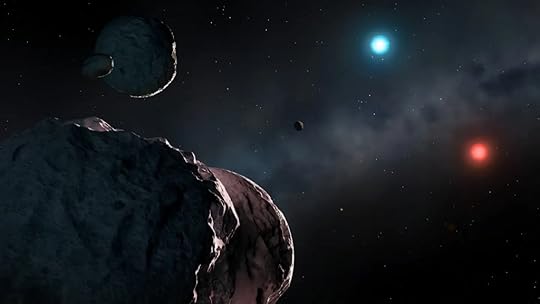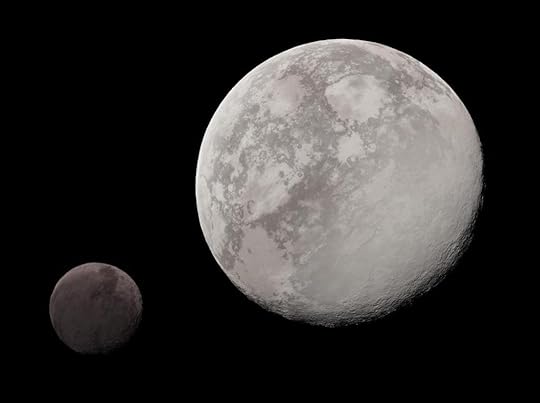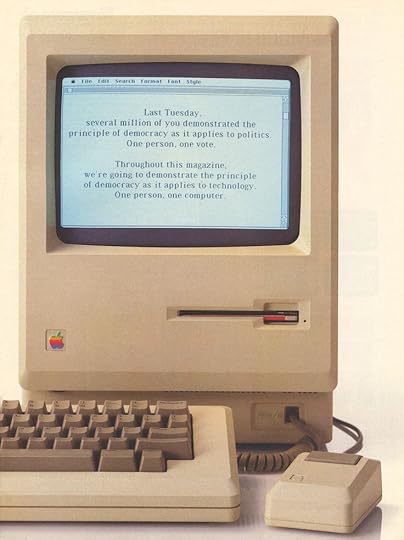M. Thomas Apple's Blog, page 10
February 18, 2024
Today’s literary quote
It is wise to have decisions of great moment monitored by generalists. Experts and specialists lead you quickly into chaos. They are a source of useless nit-picking, the ferocious quibble over a comma….The expert looks backward; he looks into the narrow standards of his own speciality. The generalist looks outward; he looks for living principle, knowing full well that such principles change, that they develop.
Frank Herbert (Children of Dune)
February 15, 2024
Bringer of Light available for pre-order!

The moment we’ve all been waiting for is nearly here!
Bringer of Light is finally set to be released on March 15, 2024! (Click the link to see a book synopsis and two brief excerpts; Smashwords also has an excerpt from the beginning chapters.)
Stop by Draft2Digital to see links to your favorite bookstore online!
(Some stores are still “publishing,” but should be ready by the drop date.)
February 13, 2024
White Dwarf the oldest star in the galaxy?

A study published this weekend in the journal Monthly Notices of the Royal Astronomical Societyproposes that the oldest star in the Milky Way is a faint white dwarf that is about 10.7 billion years old and shining roughly 90 light years away from Earth.
https://www.popsci.com/science/the-milky-ways-oldest-star-is-a-white-hot-pyre-of-dead-planets/?fbclid=IwAR3smMe_OryfOHbM03X9HZIz9CcFu85LCsmGiNe5vaBh-7678xtPO4VOuxY
The Milky Way is old. Like, really, really old. One of the oldest galaxies.
This is probably what will eventually happen to our solar system. That’s right, everything will turn to rubble and get sucked into the dying Sun.
So, given all that, there’s only one thing for it…

February 12, 2024
This is the prompt that never ends…


 View all responses
View all responses“I’ll take ‘Barely Surviving’ for $100, Alec.”
February 11, 2024
That’s no (stealth ocean) moon…oh, wait…

Mimas, the smallest and innermost of Saturn‘s major moons, is believed to generate the right amount of heat to support a subsurface ocean of liquid water
https://www.space.com/saturn-moon-mimas-stealth-ocean-world
Unfortunately the “stealth ocean” is only a few million years old, not nearly enough to harbor life.
But it demonstrates the fact that water may in fact be common in space, opening the possibility of finding life on celestial bodies with older (much older) water sources.
(FYI: Mimas orbits Saturn once every 22 hours, and is affected by tidal forces from Saturn that appear to have melted part of its icy surface.)
February 8, 2024
My latest attempt to troll as many fanbases as possible…
February 6, 2024
Easy question. Easy answer.


 View all responses
View all responsesLIfe.
I need a break from life.
Just let me hide in a cabin in the mountains with coffee and WIFI and a laptop for writing.
That’s it.

February 4, 2024
A writing prompt that almost answers itself
How do significant life events or the passage of time influence your perspective on life?
I would say “yes.”
How?
Failure influences my perspective on life.
Successes influence my perspective on life.
Deaths influence my perspective on life.
Births influence my perspective on life.
Travel influences my perspective on life.
I would list the above five as “significant events” in life. But “the passage of time” is a little more vague.
Four years doesn’t seem like a long time to me now, but it sure did when I was 18.
Even six years doesn’t seem all that long now. But to my daughter who graduates from elementary school this March, six years is half her life.
My perspective on this question is that it’s the people in my life that have changed my perspective.
Even my daughter gets this. She wants to visit Australia, Canada, Singapore, and the US again because, as she put it, “a little piece of me is still there.”
But that’s just her perspective. Or is it?
February 3, 2024
Bringer of Light, Chapter 46: Foundations of Understanding
From “The Quantum Physics of Change,” by Brady Cooper, written, it is said, as a scientific sub-text for Red Temple initiates:
Matter primarily consists of space between atoms. Nothing stands on top of anything. Things only appear to be in place. We do not create words by physically touching the pad with fingers. The spaces around the pad interact with the spaces around the fingers. We do not “sit” in chair; pressure from the atoms interact at infinitesimally small intervals to cause action and reaction, attraction and repulsion, so that we appear to be “sitting” when the spaces that comprise our bodies are merely in covalence interactions with the spaces that comprise the chair.
Thus, we can literally walk on water and walk through space; only our logical mind tells us that such things as “surface” and “space” exist, and that water as a liquid has a surface which cannot “hold” us and “space” has no oxygen with which to sustain us. Logic tells us that we cannot walk through walls. Yet walls are mostly nothing, as are our bodies…
What are “our bodies” but spaces surrounding spaces, held together by the unwritten laws of thermo and nuclear dynamics? What is the universe but endless space? Logic is but the beginning of knowledge, not its end; the “mind” of the individual is nothing but a framework needing to be filled, expanded, shared with the infinite…The “laws” of science were written by human beings, not the universe; they merely describe our perception of reality, not reality, itself.
…the key is not that we are physical and that there is too much material which interacts. Material never physically interacts, it is traditionally said, because two objects may not occupy the same space at the same time. However, two spaces may, indeed, occupy the same space, because there is nothing there. The trick is in the timing. We must confuse the ions swirling in covalence bonds around our matter that the magnetic fields attracting and repulsing them from each other ceases to be for split-nano seconds at a time. We must convince the fermions to become bosons…
The ancients believed that breaking the boundary between the physical and the spiritual was possible through either faith or mental discipline. The near-moderns taught that true reality existed in the moment of non-thought between a quick beginning and a quick finish.
This non-thought is only briefly non-existence. From nothing we come, and to nothing we return, because we are almost entirely filled with nothing…
Next: Bringer of Light, Chapter 47: The Leaving

January 31, 2024
From C64 to Mac Plus – All Hail the ’80s PC Geeks!


 View all responses
View all responses

My father got a Commodore 64 (“C64”) in the early ’80s and I learned how to type on it. Not sure exactly when, but at some point in probably 1986 or 1987 I had saved up enough to get one of my own.
Green monitor. No color. The only computer wherein the disc drive would argue with the CPU (bc the disc drive also had a CPU of sorts). 5 1/4″ floppies. Constantly switching discs in and out to load programs.
I created music (a maximum of four different sounds at a time). Learned BASIC and “machine language” and created very simple programs by copying endless pages of code from a magazine my father subscribed to (he also joined Commodore Users Group, or CUG, and got software to teach us how to type, how to write prose, and how to create family newsletters, all of which led me to eventually run my college newspaper in the early ’90s).
I played endless hours of Bard’s Tale, “Summer/Winter/World Olympic Games” (so old that there isn’t even a Wikipedia page for this series), “Sid Meier’s Pirates!,” and Strat-o-Matic baseball games (I had played the 1983 season with my father on paper, then got the 1985 season and input all the data by hand into the C64 program).
Having used my mom’s (and grandfather’s) manual typewriter for junior high school essays, I found it much easier to use the C64 to typed all my high school essays, which were printed out on my dad’s dot-matrix printer with the connected paper sheets. (I had a lot of fun separating the sheets and tearing off the hole feed strips on either side of the papers.)
I later got a C128 in college before borrowing a friend’s Mac Plus to write my senior project (our version of an undergraduate thesis).
And of course wasted hours and hours on the first version of Civilization (any Civ fans out there?).
See, back then, people like me were endlessly mocked as “computer nerds” and “geeks.”
And now you all have a tiny handheld computer that you carry around and play with 24/7.
Welcome, fellow nerds! We took over the world! Hah!









